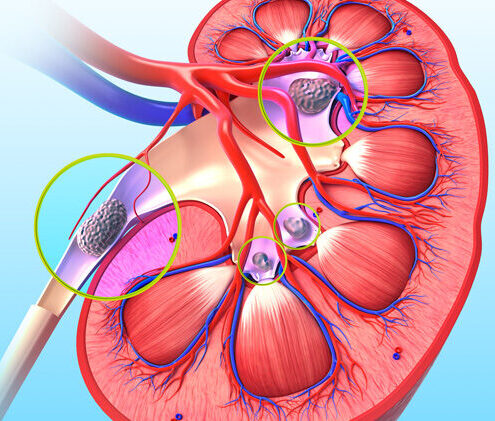Acute Renal Failure
Kidney Doctor in Navi Mumbai
Acute kidney failure is when your kidneys stop working suddenly. Doctors sometimes call it an acute renal failure. It can happen over just a few hours or days.
Acute kidney failure isn’t always permanent. If you get treatment right away — and if you don’t have other serious health problems — your kidneys can go back to working normally.
The main job of your kidneys is to filter waste out of your blood. They also remove extra fluid from your blood (this becomes urine) and control blood pressure. Kidneys help make red blood cells. They regulate electrolytes (a type of nutrient) and activate vitamin D, too.
Kidneys don’t work well when they’re damaged. This could happen because of another health condition, like diabetes. A decrease in kidney function that happens over a longer period of time is called chronic kidney failure.

- Symptoms
- Causes
- Treatments
You may not have any symptoms of acute kidney failure. Your doctor may discover you have this condition while doing lab tests for another reason.
If you do have symptoms, they’ll depend on how bad your loss of kidney function is, how quickly you lose kidney function, and the reasons for your kidney failure. Symptoms may include:
- Peeing less than normal
- Swelling in your legs, ankles, and feet (caused by your body holding on to fluid)
- Feeling drowsy or very tired
- Shortness of breath
- Itching
- Joint pain, swelling
- Loss of appetite
- Confusion
- Throwing up or feeling like you’re going to
- Chest pain or pressure
- Muscle twitching
- Seizures or coma (in severe cases)
- Stomach and back pain
- Fever
- Rash
- Nosebleed
There are three main reasons your kidneys fail all of a sudden:
- Something is stopping blood flow to your kidneys. It could be because of:
- An infection
- Liver failure
- Medications (aspirin, ibuprofen, naproxen, or COX-2 inhibitors like Celebrex)
- Blood pressure medications
- Heart failure
- Serious burns or dehydration
- Blood or fluid loss
- You have a condition that’s blocking urine from leaving your kidneys. This could mean:
- Bladder, cervical, colon, or prostate cancer
- Blood clots in your urinary tract
- An enlarged prostate
- Kidney stones
- Nerve damage in your bladder
- Something has directly damaged your kidneys, like:
- Blood clots
- Cholesterol deposits
- Medications that can directly damage kidneys, including NSAIDs like ibuprofen and naproxen, chemotherapy, and antibiotics
- Glomerulonephritis (inflamed kidney filters; can be caused by an infection, autoimmune disease (like lupus), multiple myeloma, scleroderma, chemotherapy drugs, antibiotics, or other toxins)
Treatment for AKI usually requires you to stay in a hospital. Most people with acute kidney injury are already in the hospital for another reason. How long you will stay in the hospital depends on the cause of your AKI and how quickly your kidneys recover. In more serious cases, dialysis may be needed to help replace kidney function until your kidneys recover. The main goal of your healthcare provider is to treat what is causing your acute kidney injury. Your healthcare provider will work to treat all of your symptoms and complications until your kidneys recover.
After having AKI, your chances are higher for other health problems (such as kidney disease, stroke, heart disease) or having AKI again in the future. The chances for developing kidney disease and kidney failure increase every time AKI occurs. To protect yourself, you should follow up with your healthcare provider to keep track of your kidney function and recovery. The best ways to lower your chances of having kidney damage and to save kidney function are to prevent acute kidney injury or to find and treat it as early as possible.
